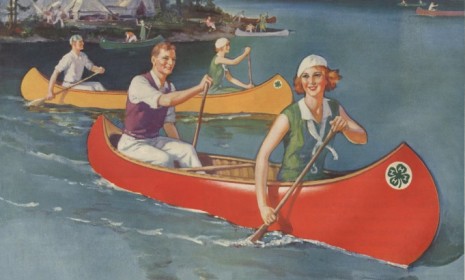Is summer camp dying?
The great American tradition of the summer sleep-away camp is under siege. Do kids no longer have time to be kids?

A free daily email with the biggest news stories of the day – and the best features from TheWeek.com
You are now subscribed
Your newsletter sign-up was successful
The traditional summer camp, memorialized in countless Hollywood movies and childhood memories, is not faring well these days. Outdoorsy sleep-away camps are falling victim to the ravages of the modern pace of childhood, camp advocates say, and childhood is suffering for it. Here's a look at what's happening to summer camp, and what it could mean:
How are camps suffering?
Annual attendance at the nation's 12,000 summer camps — around 10 million campers a year — dropped 15 percent in 2009, although there doesn't seem to be much of a further drop-off from those numbers this summer, according to the American Camp Association. More ominously, those camps that are still up and running have halved the length of their sessions: most private camps now run for three to four weeks per session instead of seven to eight weeks, and nonprofit camps now do one week instead of two.
The Week
Escape your echo chamber. Get the facts behind the news, plus analysis from multiple perspectives.

Sign up for The Week's Free Newsletters
From our morning news briefing to a weekly Good News Newsletter, get the best of The Week delivered directly to your inbox.
From our morning news briefing to a weekly Good News Newsletter, get the best of The Week delivered directly to your inbox.
What's killing camp?
In the short term, the economy, with parents deciding summer camp is a disposable luxury. In the longer term, camp is being attacked by the "viral pace of childhood" — many parents and kids are opting for day camps, which are growing as overnight camps contract and now account for nearly half the nation's summer camps. Other families are choosing specialized camps for sports, academics, arts, or other activities. Others are simply passing on camp altogether. Camps also are being squeezed as schools and school sports programs start ever earlier, as kids are pushed into résumé-building activities, and as families travel more on their own.
When did the summer camp tradition start?
In the 1880s for boys, and in the early 1900s for girls. The camps started out as a means of teaching wealthy boys in the Northeast the Victorian virtues of nature, clean living, and manliness outside of the "feminized" home. The YMCA started hosting middle-class camps in 1885, the Boy Scouts in 1910, and the Girl Scouts 1912. The camps became more professionalized with the ACA's founding in 1935. The heyday of summer camps was probably the post–World War II baby boom.
A free daily email with the biggest news stories of the day – and the best features from TheWeek.com
Is camping an international phenomenon?
Yes, but each country has developed its own flavor of camp. In South Africa, for example, upper-middle-class kids are sent to survival camps, and in China, camp is largely focused on academics: Math, grammar, science. When the summer camp tradition started spreading overseas in the 1920s, politics was central: France had communist indoctrination camps; Italy, fascism camps. New Zealand was known for its health camps for delicate children.
What's the fallout of less camp?
Camp advocates say nothing can replace the weeks of camaraderie, away from parents, provided at overnight summer camp. Day camps and specialty camps cropping up in their place don't foster the same sense of confidence, friendship, loyalty, independence, and fun, says child-development expert W. George Scarlett at Tufts University. They're "just an extension of our exaggerated focus on achievement." But there might be a silver lining if this leads to a comeback for another endangered childhood tradition — unstructured, creative "free play." Depriving kids of time when they can just be kids can cripple their creativity, says Harvard psychiatrist Alvin Rosenfeld. "Parenting is a higher calling than being a cruise-ship activities director."
Sources: Christian Science Monitor (2), FAQs.org, St. Petersburg Times, Newsweek, ACA, Boston Globe


